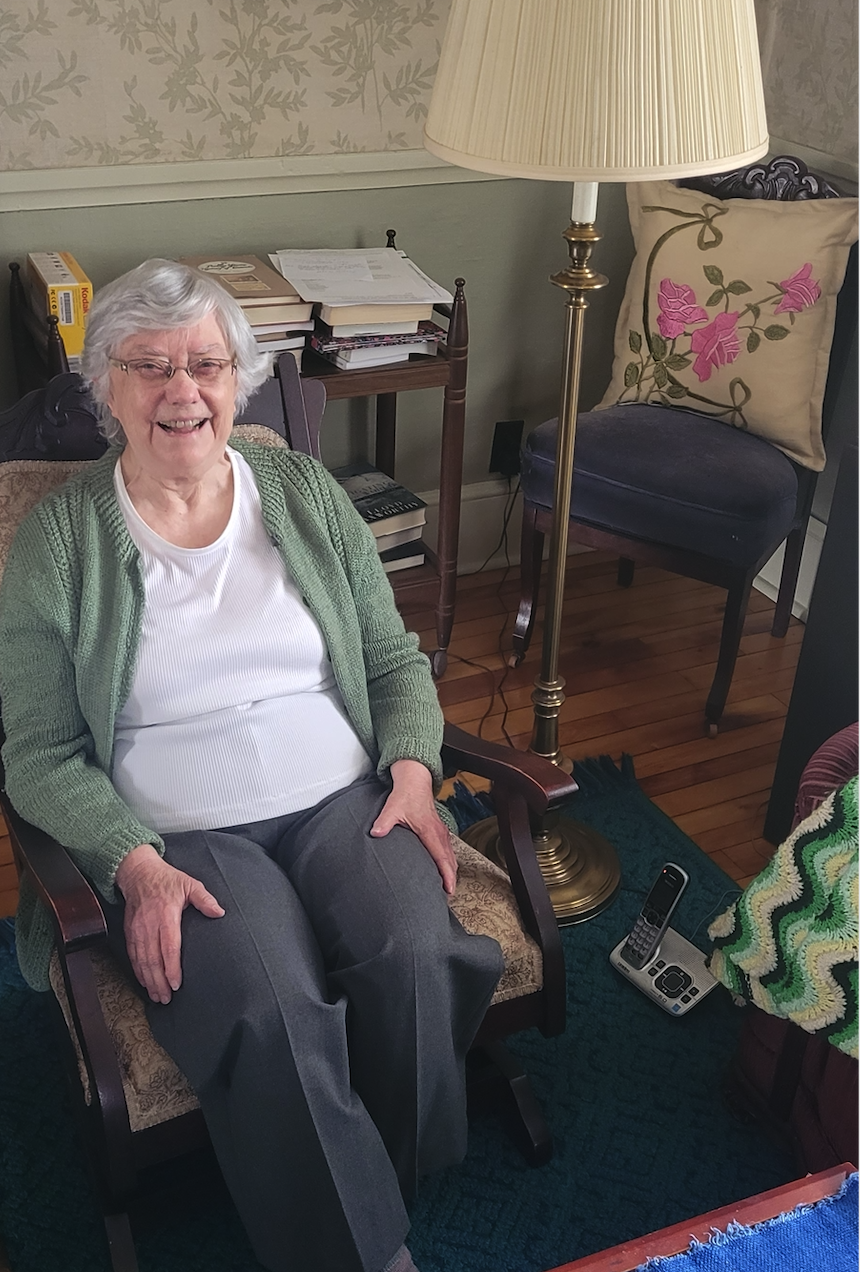Urges local anglophone community to engage with French neighbors
By Lawrence Belanger
Local Journalism Initiative
Townshippers’ co-founder Marjorie Goodfellow was recently recognized by the Office of the Commissioner for Official Languages as a pre-eminent Canadian woman who has worked for the cause of minority community rights. Goodfellow, a Sherbrooke native, has been a prominent voice in the advancement of minority language rights for around 40 years. The Record joined Goodfellow in her Sherbrooke residence to talk about the recognition, her work, and where she thinks the cause of language rights for anglophones stands now.
“I got an email from the Commissioner’s representative for Quebec, whom I hadn’t seen for 15 years,” explained Goodfellow, about being recognized. He asked her how she was doing, and informed her that they were going to reward her work with a recognition. Given her retirement from public activism, “It was a complete surprise,” remarked Goodfellow, whose last involvement in language issues ended when she left the board of directors at the CHUS.
“I spent my lifetime going to meetings,” said Goodfellow, speaking about her retirement from language rights work. “At this point,” she explained, “I decided that I deserved rest.” Although she retired, she still takes an interest in language rights, and didn’t leave without due consideration for the community moving forward.
When she left CHUS board of directors, Goodfellow made sure that the president at the time replaced her with another anglophone, which proved a good decision, because they went on to become president of Townshippers’.
Goodfellow helped found Townshippers’, a non-profit organisation advocating for the interests of English-speakers in the Eastern Townships, over 40 years ago. “It all started with the election of the Parti Quebecois,” recalled Goodfellow. “Dr. [Camille] Laurin, who was a minister in the Rene Levesque government at the time, decided to defend [Levesque’s] Bill 101…and so he decided to consult minority populations,” which included the anglophone community. Townshippers’ evolved out of the organizing committee that brought Dr. Laurin to Alexander Galt Regional High School, where he met with Sherbrooke’s ethnic minorities and the anglophone community.
“The reception was so enthusiastic from our community that we decided to keep on going, and we formed the Townshippers’ Association in fall of 1979.
The Goodfellow family roots in the Eastern Townships go back to before Marjorie’s time. Her family, of Scottish origin, came to the province in 1820. “Both my parents came from the British Isles,” her father from Northern Ireland, although her heritage is Scottish. “My father bought this place from the people who owned it in 1910,” Goodfellow estimated. Her family settled in the same house she lives in currently in 1925, after her parents married. “This house is a family house for us, but it was built by another Scottish family, the McLellans.” In fact, that section of Sherbrooke was founded by many Scots, reflected in the names of the roads out there like “Écossais” and “Peter McLellan,” the latter of which was named on Goodfellow’s suggestion.
Looking at “the fight” today, she feels there are two main threats to the rights of minority languages in Quebec. “At the provincial level, I don’t believe that the English-speaking community has enough clout, even in Montreal, to do very much at this point,” observed Goodfellow. She said that the Liberal Party of Quebec no longer sees itself as the party that will defend English-speaking people. “The Quebec Liberal Party has thoughts that its election future is dependent upon a wider scope,” reasoned Goodfellow.
At the federal level, its more “interesting”, as Goodfellow put it. Regarding C-13, the Federal legislation working its way through Parliament to “modernize” the Official Languages act, Goodfellow finds it “absolutely unconscionable” that the bill has “Quebec language legislation included at the federal level.”
Looking back at why she thinks that the federal government is in this position, she identifies the failure of the 1987 Meech Lake Accord, a series of proposed amendments to the Canadian Constitution, which was intended to persuade the Quebec government of the time to endorse the 1982 document.
“I think that the current situation is what we were warned of,” explained Goodfellow, where relationships between the government of Quebec and the government of Canada would continue to be a problem for the English-speaking minority in Quebec.
“One of the parts of the accord,” introduced by other provinces to “protect themselves” from Quebec Legislation was the now-infamous Notwithstanding Clause. “Quebec gets blamed for that all the time, but they did not put that into effect,” explained Goodfellow, who acknowledges the irony that Quebec has used the clause “very effectively.”
There’s still time to make a difference. Goodfellow urges anglophones, and anyone concerned about language rights across Quebec and in Canada, to write to their Member of Parliament, “and support the Quebec Community Groups Network,” which has established two petitions on the matter.
She also had a few words of advice for the anglophone community on how it can reverse its declining power, some of which she mentioned before in an editorial published in Townships Weekend last November. “As I said in my piece, I would encourage people to get involved in the French-speaking community.” To reverse the anglophone community’s declining “clout”, Goodfellow believes that English speakers can’t cloister away in insular communities, expecting to be protected.
She says anglophones should use “every opportunity to show our French-speaking friends and neighbours that we are not the bad guys.” “We are not going to ruin their language. By and large, we speak it,” she added. Building friendships and relations with our francophone neighbors means getting involved in organizational structures, “which is what we used to do,” lamented Goodfellow.
English-speaking youth are out in the community, “all the time,” but they’re not getting involved in any institutions in the community. She encourages anglophones to join municipal committees, tourism boards, or to reach out to the museums in the area, all of which she has done in the past.
“There are all sorts of committees in the city of Sherbrooke,” explained Goodfellow. “Sure, it takes a lot of time, but you’re there to show that you’re a member of the community, and that you care, and that you are one of them.”


